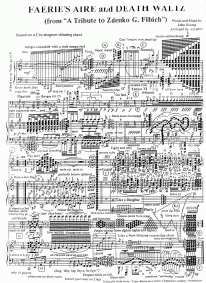There will be dark days in your music practice when you ask yourself why you are doing this. When playing your musical instrument or singing is the last thing you want to do, when the act of playing or singing is infuriating and frustrating. “What’s the point,” you might ask, “I’ll never be as good as [insert name of famous player of your instrument/singer here].”
You don’t have to be. No one is asking you to be [famous name]. All you need to be is you.
Hey, I’m never going to be Vladimir Horowitz. But I play better than the guy down the street who doesn’t even make an attempt. And so can you. And little by little, you get better.
To someone who can’t play/sing at all, you’re spectacular.
And as frustrating as some days can be, there will be other days when you’ll look at the instrument and just play it. You’ll rise up singing. And it will soothe your soul, and make the world a little brighter. The sound of your music might make someone else’s day too.
So what do you do on those days when music is a chore not a delight? Practice for ten minutes. Then stop. If you do that every day, even taking a day off, you’ll have practiced for a whole hour by the end of the week. And it is possible that after those ten minutes, you’ll want to continue, maybe it’s not so bad today after all. Or maybe it is that bad—so stop. At least you played ten minutes.
Challenging yourself to learn a more difficult piece than you’re used to can yield great rewards, after, no doubt, great frustration. Polishing silver is a pain in the neck, but it’s so nice and shiny when you’re done. Polishing a phrase, no less so.
Put your heart into your music and it will show. Whether it’s Three Blind Mice or Liszt, make it yours. Because only you can play like you.
For the non-musicians (ok, musicians too)
For the non-musicians, the frustration may be stated as “I can’t make head or tail of this music.” You may have been told of the splendors of a given piece, and upon listening to it…just don’t hear it.
It’s ok.
You need to listen to it more than once before you start to hear details. The more you listen, the more you’ll hear. If you can read about the piece, in liner notes, a review, or an explanation, you can find out what to listen for. See if you can hear a repeating pattern. Or an almost repeating pattern (the composer is playing with the pattern to see how it can be altered, and sometimes, how many ways it can be altered).
I bet if you go back after not listening to it for a few weeks, then listen again, you’ll hear something you didn’t hear the first time. You’ll catch some other detail.
The thing about classical music is it takes time. It takes focus. But listening, just like playing or singing, is a skill that can be developed. And the payoff is great.
And what if you still don’t get it? Or you don’t like it?
Try another era of music—you’ve got something like 1000 years of music to choose from. If you don’t get baroque, listen to music from the romantic period. Don’t like romantic? Try the classical period. Not feeling Mozart? Try Debussy. At some point, something will tug at your heart, or make you think, or make you want to dance. Now, we’re getting somewhere!
Here’s something to get you started. Listen to how many ways Mozart alters this tune, which I think you’ll recognize.
And here are some pictures of some other folks having a bad practice day that you might enjoy.


July 13, 2015 at 11:39 am
It’s so clear that you understand, Chris. This was well-expressed and should be helpful. I know. I’ve been there.
LikeLike
July 13, 2015 at 3:32 pm
I think we all have, Beth. Sometimes it’s hard to see when we’re in the middle of it. I hope it will help.
LikeLike
July 15, 2015 at 4:32 am
Nice! Very encouraging indeed. Do you know John Holt’s lovely book on learning as an adult to play the cello? And one of the NPR guys wrote a book a few years ago on playing the piano, also starting, as I recall, as a grown-up. Was it Noah Adams? Or…? People might be energized by reading the Holt book.
Thanks!
Tom
LikeLike